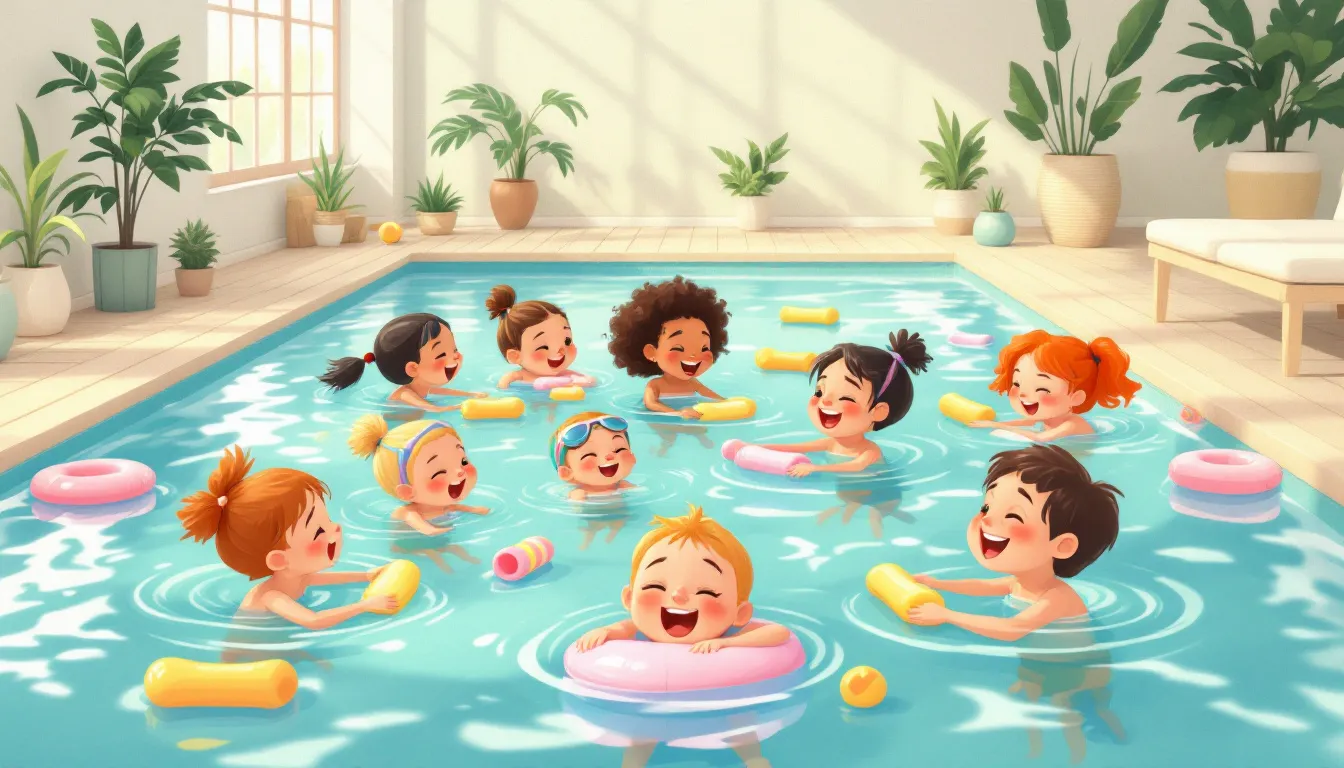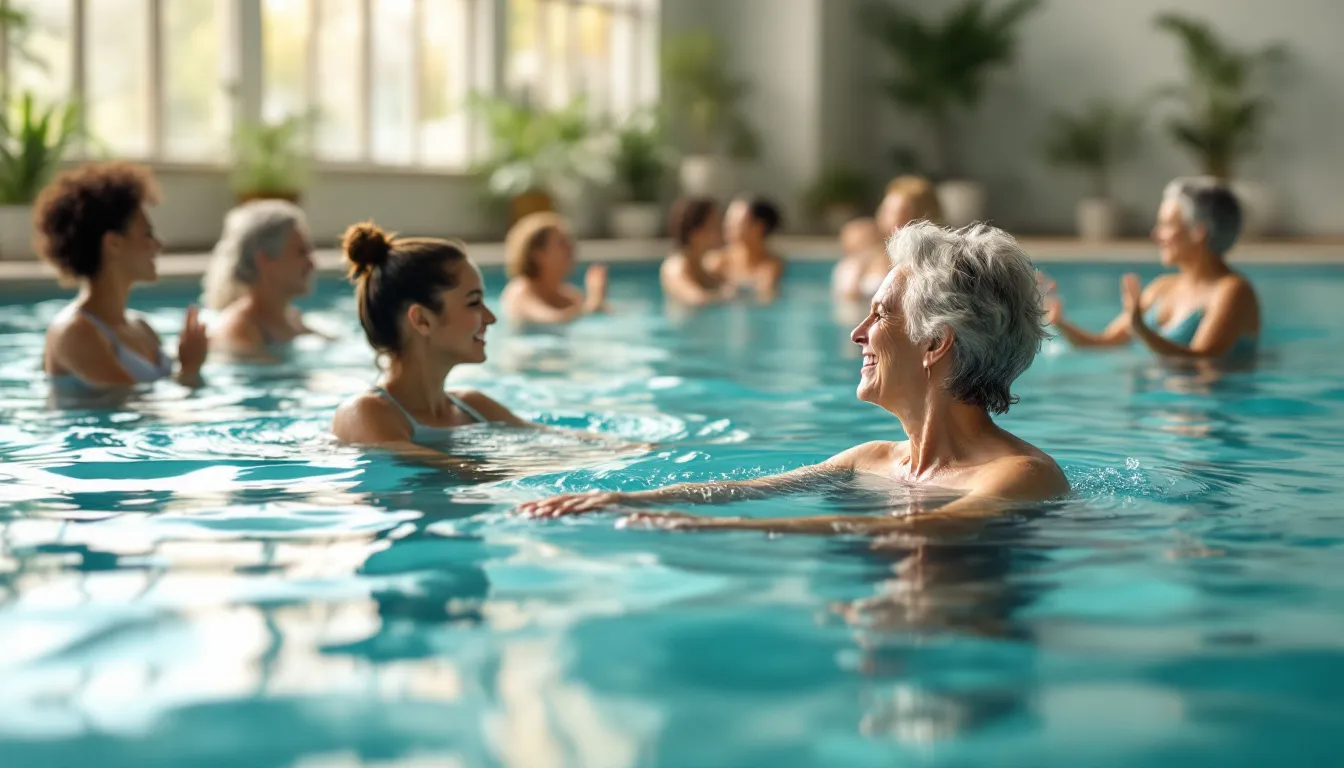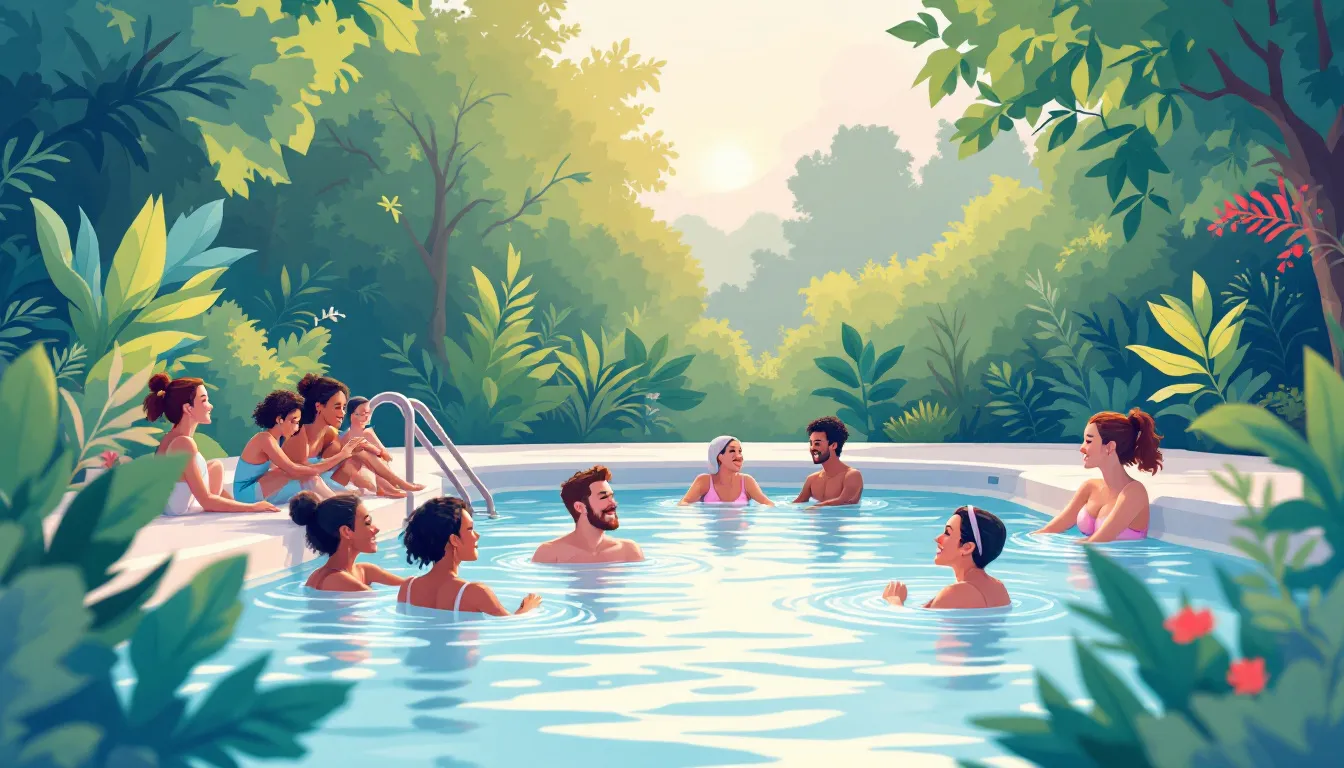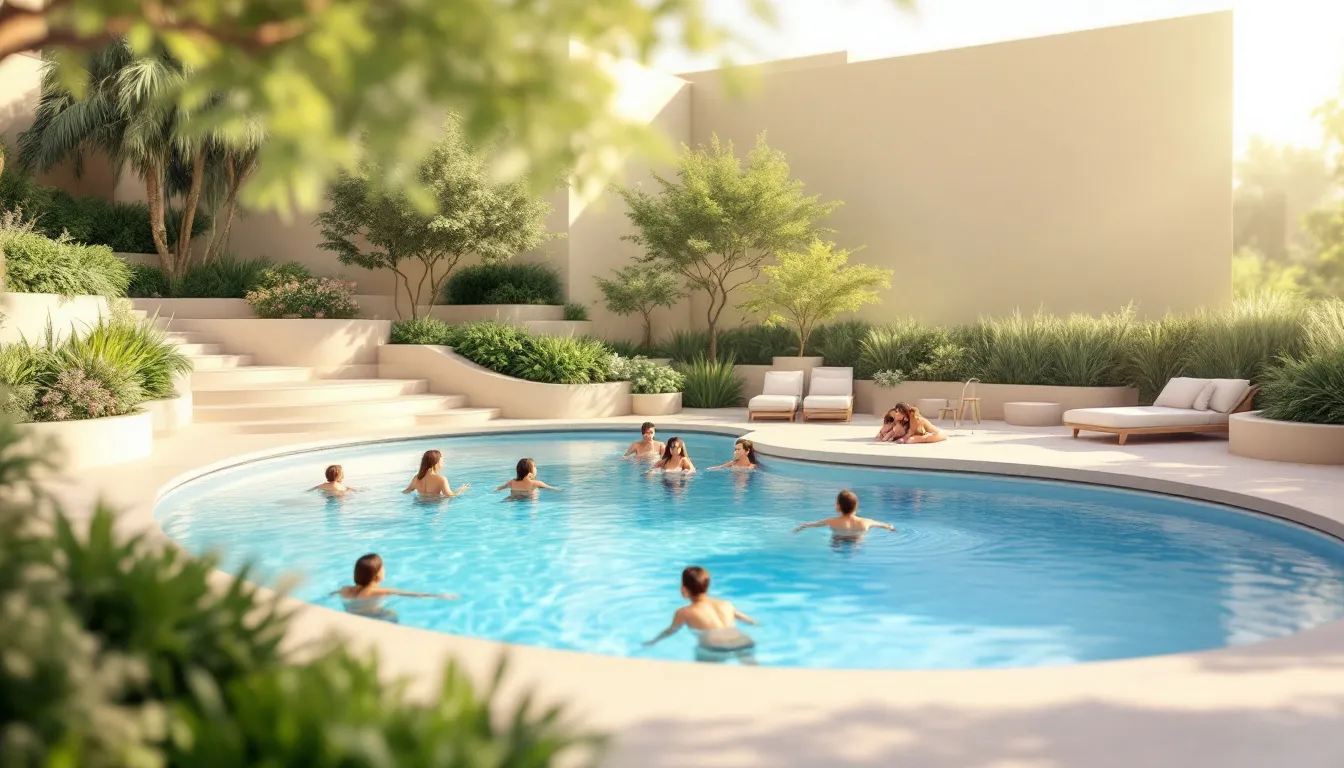
Top Aquatic Wellness Programs for All Ages in Residential Swimming Pools
Key Takeaways
Aquatic wellness programs for all ages focus on building water confidence and safety skills, essential for preventing drowning.
Programs cater to different age groups, from infant water acclimation to adult fitness, ensuring inclusivity and tailored instruction.
Owning a residential pool enhances family bonding, offers year-round access to swimming, and provides a controlled environment for health and wellness activities.
Family-Friendly Swim Programs
Family-friendly swim programs are a wonderful way to encourage bonding and create lasting memories. Charlotte Aquatics offers parent-child classes that cater to children ages 3 months to 2 years, promoting early water interaction and comfort. Activities such as exploring body positions, floating, and blowing bubbles help children become familiar with water while instilling fundamental safety skills. These sessions are not just about learning to swim; they are about fostering a supportive environment where children and parents can enjoy the water together.
Goldfish Swim School provides family swim times, allowing families to bond and have fun in the water together. Maintaining a pool at home can further encourage this bonding by making it easy and convenient for families to enjoy recreational activities together.
While swim lessons are crucial, they should be part of a broader approach to water safety that includes constant supervision to prevent drowning incidents. These programs aim to create confident swimmers who are comfortable and safe in the water, ultimately leading to a lifetime of enjoyment and fitness. Additionally, a swim lesson can enhance the overall experience as we teach swim lessons.
Infant and Toddler Water Acclimation
Introducing infants and toddlers to water at an early age is crucial for building comfort and preventing drowning. The Baby Bonding class, designed for infants aged 3 to 5 months, focuses on enhancing growth through sensory experiences in the water. As children grow, the Toddler 1 class, aimed at children aged 6 months to 30 months, builds on this foundation by promoting water safety through interactive activities that make learning fun. These early experiences are vital for fostering a positive relationship with water.
Toddlers who progress can move on to the Toddler 2 class, which continues skill development through games and activities, requiring mastery of Toddler 1 skills and a certain skill level. The Toddler 3 class enhances independent water confidence by focusing on consistent back floating and essential safety skills for those who advance further.
There is even an advanced, invitation-only class named TOT for toddlers who have progressed beyond Toddler 3, focusing on skills without parental presence. These structured programs ensure that children develop water safety and swimming skills from a very young age, setting the stage for a lifetime of aquatic enjoyment.
Children's Swim Lessons

Children’s swim lessons aim to build essential swimming skills while ensuring water safety. These lessons focus on comfort in the water, teaching children how to tread water and proper breathing techniques. The curriculum is structured so that each level builds upon previously learned skills, allowing for progressive development. This approach ensures that children become confident swimmers who are comfortable in various water situations.
Different formats of swim lessons are available to cater to various learning styles:
Group classes provide a supportive environment where children can learn alongside their peers.
Private lessons offer personalized attention for rapid skill development.
Semi-private lessons combine personal coaching with social interaction.
These options allow parents to choose the best setting for their child’s learning needs, ensuring that they receive the proper instruction to become proficient swimmers.
The swim curriculum includes essential techniques such as the front crawl, back crawl, and butterfly stroke. Instructors ensure that students master each skill before moving on to the next level, fostering a sense of accomplishment, confidence, and knowledge. Students often take a break to reflect on their progress and build their swim skills further.
These programs aim to create a lifelong love for swimming in kids, catering to both beginners and more advanced swimmers. Whether in outdoor or indoor pools, the goal is to teach children the necessary skills to enjoy the water safely and confidently.
Teen Swim Training
Teen swim training programs cater to varying skill levels, from beginners to competitive swimmers looking to enhance their technique. These programs often include:
Specialized training for sprinting and long-distance events, helping teens improve their performance in competitions
Stroke technique improvement, which is crucial for achieving better times and overall performance
Development of skills necessary to excel in swimming
Promotion of physical fitness and endurance
In addition to physical training, teen swim programs focus on building mental toughness. Competitive training programs often include tailored workouts that enhance overall swimming capability and endurance. This holistic approach ensures that teens are not only physically prepared but also mentally resilient, ready to face the challenges of competitive swimming.
The structured environment of these programs allows teens to progress at their own pace while receiving guidance from experienced instructors. Whether they are aiming to become professional swimmers or simply looking to improve their fitness, these programs provide the necessary tools and support for skill building. The combination of physical and mental training prepares teens for success both in and out of the pool.
Adult Aquatic Fitness

Adult aquatic fitness programs offer a range of options to cater to different skill levels, from beginners to advanced athletes. Masters Swim programs, designed for adults 18 and older, focus on fitness improvement and competitive swimming techniques. These programs provide a structured workout environment where participants can improve their swimming technique while enjoying the benefits of physical fitness.
Engaging in aquatic fitness offers numerous health benefits:
The low-impact nature of swimming makes it an excellent exercise for muscle engagement and cardiovascular health.
Aquatic exercises enhance joint mobility and flexibility, making them ideal for overall well-being.
Participating in these programs can improve mood and sleep quality.
Aquatic fitness offers relaxation and relief for sore muscles.
Various class formats are available, including private, semi-private, and group classes, allowing for tailored instruction. Aqua classes target strength and cardiovascular stamina through enjoyable and dynamic water exercises. Lap swimming is another effective workout to build strength and enhance overall fitness, suitable for adults of any age.
These programs aim to create dedicated confident swimmers who feel confident and safe in the underwater water, promoting lifelong fitness and health while helping them learn to float as a competitive swimmer in the right program.
Senior Aquatic Wellness
Senior aquatic wellness programs focus on the unique needs of older adults, offering low-impact exercises that improve strength, balance, and flexibility. Aqua aerobic therapy has been shown to effectively reduce pain and improve function in individuals with arthritis. These programs typically include a combination of warm-up exercises, aerobic activities, and stretching, supporting joint health and cardiovascular fitness.
Regular participation in aquatic exercises helps prevent falls by enhancing lower body stability and strength. For seniors, these programs offer a safe and enjoyable way to stay active and healthy. The supportive environment of these classes ensures that participants can exercise at their own pace while receiving the benefits of improved physical fitness and overall well-being.
Adaptive Swim Programs

Adaptive swim programs are designed to provide essential aquatic activities for individuals with special needs, fostering inclusion and confidence in the water. Private lessons are particularly beneficial for individuals with anxiety or fear of water because:
They offer a supportive learning environment.
Learners can progress at their own pace.
This personalized approach reduces the likelihood of accidents.
It creates a safer learning atmosphere compared to group classes.
These programs aim to develop swimming skills while promoting water safety and confidence. By catering to the unique needs of each participant, adaptive swim programs ensure that everyone can enjoy the benefits of swimming, regardless of their abilities.
The inclusive nature of these programs helps individuals build confidence and improve their access to quality of lives through aquatic activities.
Private Swim Lessons
Private swim lessons offer personalized instruction aimed at helping individuals improve their swimming technique or gain comfort in the water. With one-on-one attention, students can develop skills more rapidly as instructors provide immediate feedback and tailored lesson plans. This goal-oriented approach ensures that learners achieve their specific objectives, whether it’s mastering a new stroke or building confidence in the water.
The flexibility of private lessons allows participants to choose times that fit their personal availability, making it easier to incorporate swimming into their schedule. These lessons cater to individual goals and learning styles, providing a customized experience that enhances the effectiveness of the instruction.
By focusing on each person’s unique needs, private swim lessons help create confident swimmers who are comfortable and safe in the water.
Semi-Private and Group Classes
Semi-private swim lessons typically involve:
Two to three participants, offering a balanced environment for learning.
Being more affordable than private sessions, making them a cost-effective choice for personalized instruction.
Participants motivating each other, creating a positive and supportive learning environment.
Maintaining a balance of individualized attention and social interaction, fostering teamwork and camaraderie.
Group classes, on the other hand, provide a dynamic environment where members can progress together. These classes are ideal for those who thrive in a team setting and enjoy social interaction. Instructors ensure that each participant receives the guidance they need while promoting a collaborative and encouraging atmosphere.
Whether in a semi-private or group setting, these classes offer a comprehensive approach to learning swimming skills that are covered in the course.
Water Safety and First Aid
Water safety and first aid are crucial components of any swimming program. Recognizing the signs of distress in swimmers is vital for responding quickly in emergencies. Parents should ensure that swim instructors are certified in CPR and first aid, providing an added layer of safety for their children. These certifications ensure that instructors are prepared to handle emergencies and provide immediate assistance if needed.
Adaptive swim programs also emphasize water safety, instilling confidence and safety awareness in participants. These programs aim to create confident swimmers who are not only skilled but also aware of the importance of safety in the water. By incorporating water safety and first aid training into swim lessons, programs ensure that participants are well-prepared to enjoy the water safely and confidently.
Benefits of Residential Pools

Owning a residential pool offers numerous benefits, including:
The ability to swim year-round without depending on public pool hours or seasonal limitations.
A controlled environment for cleanliness, ensuring a more enjoyable experience compared to public swimming facilities.
An enhanced overall swimming experience that is more pleasant and hygienic.
A residential pool offers several benefits:
Health and fitness advantages
An ideal venue for gatherings and celebrations, enhancing social interactions within the community
Increased property market value, making it a valuable investment for homeowners
The various advantages of owning a residential pool and outdoor pools make it an attractive option for families looking to improve their quality of life through aquatic recreation activities.
Summary
Aquatic wellness programs in residential swimming pools offer a wide range of benefits for individuals of all ages. From early water acclimation for infants and toddlers to specialized training for teens and fitness programs for adults and seniors, there is something for everyone. These programs promote physical fitness, mental well-being, and water safety, ensuring that participants can enjoy the water safely and confidently.
The advantages of owning a residential pool extend beyond personal health and fitness. They provide a controlled environment for swimming, enhance social interactions, and increase property value. By incorporating these programs into their routine, families can create lasting memories and improve their overall quality of life. Embrace the benefits of aquatic wellness programs and make swimming a part of your family’s lifestyle.
Frequently Asked Questions
What age should children start swim lessons?
Children can start swim lessons as early as 3 months old, particularly with programs designed to enhance sensory development. Starting early can help instill confidence and comfort in the water.
Are private swim lessons more effective than group lessons?
Private swim lessons are generally more effective due to personalized instruction and immediate feedback, allowing for quicker skill acquisition. However, group lessons can enhance learning through social interaction, so the best choice depends on individual preferences and goals.
What are the benefits of aquatic fitness for adults?
Aquatic fitness provides low-impact exercise that enhances muscle engagement, cardiovascular health, joint mobility, and flexibility. Additionally, it contributes to improved mood and sleep quality, making it a great choice for overall well-being.
How do adaptive swim programs help individuals with special needs?
Adaptive swim programs significantly enhance the confidence and skills of individuals with special needs by offering tailored instruction in a supportive environment. These programs promote safety and inclusion, allowing participants to enjoy the numerous benefits of swimming.
Is owning a residential pool worth the investment?
Owning a residential pool is worth the investment as it provides year-round enjoyment, enhances property value, and serves as a perfect venue for social gatherings. Ultimately, it can be a valuable addition to your home.

